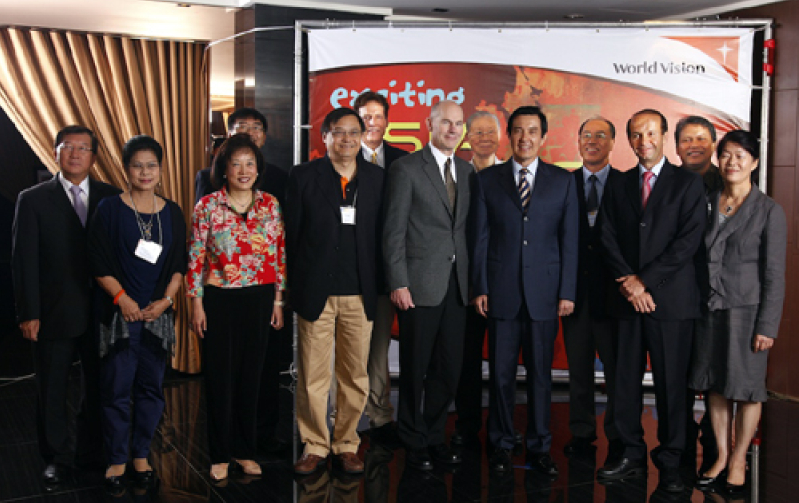
Taiwan’s President Ma Ying-Jou spoke at the World Vision’s 2011 Asia Forum, where the Christian humanitarian organization’s executive directors, president, and leaders from around 30 nations convened.
In his speech, Ma shared the five new roles that Taiwan is preparing to take on after the nation’s hundredth anniversary and the meaning of collaborating with World Vision; citing Taiwan as an example, the president explained how the government, NGOs, and the local organizations can effectively form a tri-party partnership model.
During this past hundred years since founding of Republic of China, Ma said that Taiwan has developed from an economically impoverished nation to a first world nation, so it is at this key moment Taiwan hopes to improve its international involvement through five identities: first, peace-maker; second, humanitarian worker; third, cross-cultural exchanger; fourth, provider of technology; fifth, proclaimer of the Chinese culture.
Ma, a Harvard Law School graduate, believes that through active international involvement Taiwan will let the world see her friendly citizens and the culture, winning the respect and friendship of the international society.
Morever, Ma pointed out that within the structure of globalization Taiwan has the responsibility and volunteering duty to show concern to the problems around the world. In the example of Burkina Faso in West Africa, he said that the students there had to rely on street light posts to read books because of the lack of electricity. With the sponsorship of solar-panel electricity charger setup at the schools and lamps, students are now able to charge their batteries during school time and have sufficient electricity for lighting an entire night of reading and writing, which serves as an incentive to ensure the students to study at school.
Up until today, World Vision Taiwan has provided 1,500 lamps of solar-powered “Lights of Taiwan” and they will provide 4,000 more to Mali, Malawi, and Seirra leone, illuminating the African children’s path to higher education.
According to Taiwan’s media coverage, Ma shared the three-sided golden triangle partnership model between government, NGOs, and local areas that will allow for maximum utility during times of emergency. Using the Typhon Morakat that happened in 2009 as an example, he said that with the government’s facilitating, World Vision Taiwan and other NGOs executing, and the close collaboration with local departments, repetitive waste of society’s resources were prevented, which resulted in legally and effectively achieving the goals, actually executing the emergency relief and reconstruction.
With the highest number of the absolute poor and the highest number of middle class and millionaires, Asia has much need, but also have much more resources and opportunity for growth.
Kevin Jenkins, executive director of World Vision International, raised numerous topics of discussion that promotes for thinking creatively, leading the leaders from all around the world to reflect deeply on the future work that needs to be done in Asia-Pacific; some of the points that he mentioned include the effective use of technology to improve communications between children and the mass, service, facing the direction of achieving the millennial goals set by United Nations, and how to raise the children’s vision, so not only will have enough to eat, but they can have hope to develop other relevant topics of their lives.
In 2010, World Vision Taiwan has fundraised to help around 100,000 children in Asia, including Taiwan, and World Vision has sponsored a total of 1.22 million impoverished children.
President Ma and Taiwan’s First Lady Chow Mei-Ching have been child sponsors of World Vision Taiwan since 1997. Chow has travelled in person to visit the poor and those affected by natural disasters. Last year, she and their daughter traveled to Haiti to volunteer to care for the children. The president and his wife now sponsor a total of 16 children, and they’ve always wrote letters and gave gifts throughout this period of sponsorship.






